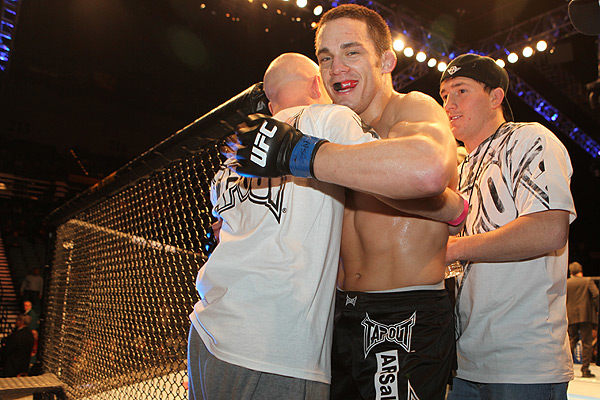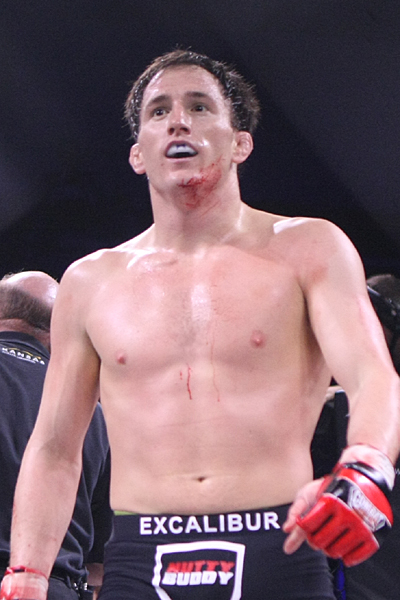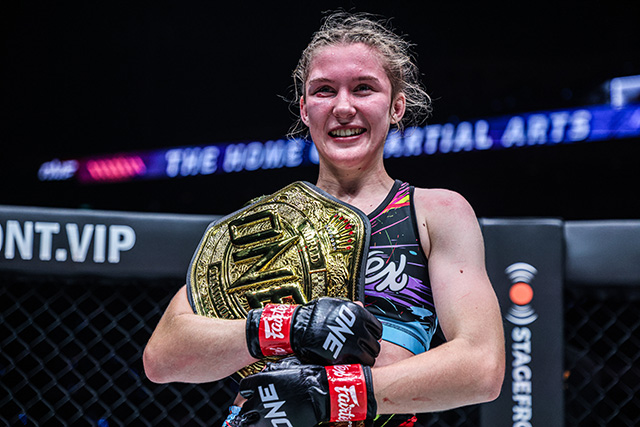Thicker Than Water
Blood Brothers
Joseph Santoliquito Apr 27, 2012

Joe Ellenberger was not used to this. This was the time to feel robust, that I-can-walk-through-fire or anyone-at-anywhere time a fighter always builds during training. That time to rinse the mind and become invincible. Staunch all doubt. Grow a tunnel’s scope towards a desired goal and smash it.
Only that time was not happening for Joe in July 2009. His back ached. His stomach churned. He could not escape the hollowness. Workouts zapped him more than normal. He was so enervated he was sleeping close to 12 hours a day. Every training camp, Joe knew where he had to be with his conditioning, his strength and his weight. As he readied himself for Joe Wilk, only a few weeks away, his body gauge was terribly off. His training was not progressing as it usually did. He was not sure why, so he pushed through, staying true to his routine, putting off what was coursing inside him, corroding parts of him he did not realize existed. Eating away at his very marrow.
Advertisement
That summer, Joe was surging. He had everything, a blossoming MMA career with a 10-0 record that garnered the attention of honchos like Ultimate Fighting Championship matchmaker Joe Silva. Life was good, and nothing was going to change that, or so Joe thought, along with his wife, Vanessa, and twin brother, rising UFC star Jake Ellenberger.
Little did any of them suspect what was about to enter their
lives.
Until October 2009, Joe had never heard of Paroxysmal Nocturnal Hemoglobinuria. Not many have. PNH is a rare, acquired bone-marrow disease in which red blood cells break down earlier than normal, causing blood clots or internal bleeding that could result in death. People with PNH often survive for as little as five to 10 years, though some live for more than a decade after their diagnosis.
Joe thought he had a bug, which he felt explained the lethargy he experienced while training for the Wilk fight.
“I had the idea it was something small, but I felt so tired all of the time I had to get it checked out,” Joe recalled. “When I was getting ready [for Wilk], I put it off and kept training.”
He first got checked locally with a workup and some blood tests. No answers. He went to a Nebraska medical center for still more tests. Still no answers. Then, finally, wondering and growing frustrated as to what was happening, why he could not do the things he normally did, Joe appealed to the highest medical research center in the country, the Mayo Clinic in Rochester, Minn., in September 2009.
“I wanted answers,” Joe said. “At the time, I still didn’t think it was anything serious.”
A month later, he was back working out in Kearney, Neb., where he was a graduate assistant coach for the wrestling team. That day in October 2009, Joe received his answer.
“The nurse from my doctor’s office called to tell me to come in the next day and they’d tell me what the tests said,” Joe said. “I wanted to know. Why not tell me over the phone? Again, I didn’t think it was anything serious. They finally said I had PNH. I [had] never heard of this before. She didn’t tell me exactly what is was, so I called my fiancée (now wife, Vanessa) and told her. I was going to wrestling practice. I didn’t think anything of it. The next thing I know, Vanessa calls me back and she’s crying hysterically. She looked it up on the Internet, and it said this disease carries a lifespan of five to 10 years.

Keith
Mills
Joe Ellenberger was 10-0 when
the unthinkable happened.
“I told her that I would be fine, [that I was] going to be late for practice. That was it,” he added.
“I got back to the locker room [and] I texted my brothers and my mom and dad to tell them what I had. They had no idea what it was, either.”
After practice, Joe had 30 missed calls and missed texts. Everyone was concerned. Joe himself finally researched PNH and set up a doctor’s appointment for the next day. His whole family flew into Kearney.
“I wasn’t worried in the least bit. I didn’t feel good, but it didn’t hit me until my entire family got to town that something was wrong, maybe something serious,” Joe said. “It hit me further when we spoke to the doctor. She didn’t know my profession. I explained it to her, and she confessed that she never dealt with this disease before. The hardest part came later. They told me that I wouldn’t compete again. There was the risk of blood clots.”
It explained the abdominal pains Joe was experiencing. They were caused by small blood clots in his stomach. He was put on a blood thinner and warned he had a long, unknown road ahead.
“When the doctor said that I wouldn’t be able to compete in any combat sports for the rest of my life, I went from being confused to feeling I might as well be dead,” Joe remembered. “Jake was as upset, maybe even more upset than I was. We not only had aspirations of getting into the sport together, we would be world champions together. I felt like I was leaving Jake, and that was the hardest thing I had to come to grips with. I know he had as tough a time as I did.”
The news came a month after Jake’s UFC debut against Carlos Condit. It was a blow to the heart.
“Joe Silva called me a week later to compete in UFC, and that sucked,” Joe said. “At the time, I wasn’t sure what this whole disease was and the risk factor. I didn’t tell Joe that I had this disease, and it was hard to come to grips with what just happened. I had more than a few sleepless nights. I needed to make sure Jake was OK and understood that I’d be there for him. I just couldn’t bear what everyone else was going through.
“I put my faith in God and I knew he had a plan for me, but the hardest thing was getting everyone else to cope with what I was going through,” he added. “Obviously, not being able to train with my brother was the worst-case scenario ever.”
It was Jake who got Joe involved with MMA. They were raised in a typical suburban neighborhood, a pool in the backyard, a tight basement where the twins would roughhouse on the sofa cushions they spread over the floor. As Joe and Jake entered their teen-age years, a slight schism took place. Joe began drifting more toward the jocks, his wrestling cohorts, while Jake took to hanging with a more fringe social crowd, his skateboard buddies.
They were also developing very different personalities, too. Though Joe is older by a minute, it was Jake that sometimes played the role of protector. Ironically, Jake steered away from confrontation while walking the halls of Millard South High School in Omaha, Neb. In fact, he actually went great lengths to avoid it.
“There was one time when we were young [and] some kid spit on Jake, and he did nothing; he wiped it off and walked away, and I started yelling at the kid,” Joe recalled. “The kid pushed me, and that set Jake off. He gets spit on and he walks away, and the kid pushes me, and that fires him up. That was Jake. Jake got picked on a lot, but Jake never, ever let anyone cross the family. If anyone said anything to me or my older brother, Adam, Jake was right there.”
Whereas Joe was driven, as a three-sport athlete in track, football and wrestling, Jake had some issues with self-motivation. Joe became a state champion wrestler and saw a future in the sport. Jake, on the other hand, was a push-me-I-come type who had no future aspirations. Jake’s nonchalance and lack of ambition used to gnaw at Joe.
“It was frustrating, because I knew how good Jake could have been in anything he applied himself to, but he never did then,” Joe said. “He had this good monster inside him that needed to be brought out. Jake finished second in the state in diving his senior year. He blew his final dive, and he was so pissed off he walked home. That’s one of the first times I saw Jake angry and his competitive juices flowing.”
Joe went on to become a two-time Div. II all-American wrestler at the University of Nebraska Kearney, earning his degree in industrial distribution in 2008. He went on to pursue a graduate degree in sports administration, with the intention of one day becoming a coach or high school athletic director. Jake, however, took a life-altering turn into the Marine Corps. He made a 180-degree spin from being the waffling, indecisive kid that lacked vision to carrying an acute sense of who he was and what he wanted to do.
“
wouldn’t be able to compete
in any combat sports for the
rest of my life, I went from
being confused to feeling I
might as well be dead.
”
“It took a lot of time for me to realize my potential,” he added. “Joe helped me see that. It was Joe and the Marine Corps. I didn’t realize it. Other people used to see things in me that I needed to believe. The Marine Corps changed me in some ways. I was kind of lost and never really followed through with anything in my life.”
“In the Marine Corps, you don’t have a choice. You have to follow through. It taught me that whatever I was going to do, I had to do it 100 percent.”
Unbeknownst to Joe, their lives would change inexorably in April 2005. At the time, Joe was still at Nebraska Kearney competing on the wrestling team, while Jake was working at a local fitness center in Omaha. Jake had a friend who boxed and invited him to check out a mixed martial arts event.
“Jake calls me about this thing [and] to come on down and check it out,” Joe said with a laugh. “Oh, I remember it all right. I took the two-hour drive from Kearney, show up and Jake tells me, ‘I signed you up.’ I’m like, ‘For what? I don’t know how to fight this way.’ He signed me up before I even got there, and then Jake told me it was brand new and no one there really knew how to fight.”
It was a smoker in a small auditorium before about 600 people using a makeshift boxing ring for the fights. Joe thought he knew enough wrestling to get by, but here, he was matched with a four-time Nebraska wrestling champion, Kasey Kohl.
“Now I’m in trouble,” Joe said, recalling his feelings at the time, “but I really surprised myself. I hit him, kneed him to the face and knocked him out. Jake’s fight was similar. It went for about a minute.”
Problem was Omaha is small. Word got back to Donna Ellenberger, Joe and Jake’s mother, that her boys were fighting. Her immediate image was Brad Pitt’s discolored, battered face in “Fight Club.” That was not happening to Joe and Jake. She warned her sons that if they ever fought again, they better forget to come home. Mom folded after about a week when Joe explained to her it was a sport, not a barroom brawl. Donna is now a huge MMA fan who sends texts to her sons after each of their fights.
Finish Reading » “We thought he might have the mononucleosis virus. Never did we think this would be something that would affect him for the rest of his life.”
Related Articles







